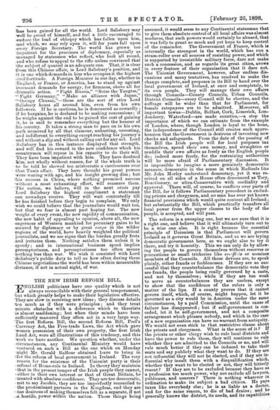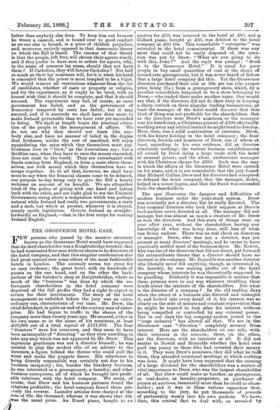THE NEW IRISH REFORM BILL.
-ENGLISH politicians have one quality which is not always reconcilable with their general temperament, ?but which greatly helps to make their legislation effective. 'They are slow in receiving new ideas ; they discuss details 'too much as if they were principles ; and they treat minute obstacles with a deference which to theorists 'is almost maddening; but when their minds have been sufficiently manured they often act in a very large way. The first Reform Bill, the second Reform Bill, Peel's Currency Act, the Free-trade Laws, the Act which gave 'women possession of their own property, the first Irish .Land Act, were all illustrations of this tendency, and this week we have another. We question whether, under the ,circumstances, any Continental Ministry would have -ventured on such a Bill as the one which on Monday -might Mr. Gerald Balfour obtained leave to bring in (for the reform of local government in Ireland. The very .reason for the existence of the Unionist party is their ,refusal of Home-rule to Ireland. In theory they maintain 'that in the present temper of the Irish people they cannot, teither in their own interest or that of Great Britain, be ,treated with absolute confidence. They are too democratic, 'not to say Jacobin, they are too imperfectly reconciled to the predominant partners in the Kingdom, and they are too desirous of making themselves felt as a separate, if not ._hostile, power within the nation. Those things being assumed, it would seem to any Continental statesman that to give them absolute control of all local affairs was almost madness, that such powers would certainly be abused, that it was folly to grant so much and yet hope to keep control of the remainder. The Government of France, which is internally the strongest in the world, which has run a. steam-roller over all sources of resisting power, and which is supported by irresistible military force, dare not make such a concession, and as regards its great cities, avows in every feature of their organisation that it dare not. The Unionist Government, however, after endless dis- cussions and many tentatives, has resolved to make the change complete, and proposes in its Bill to hand over the local government of Ireland, at once and completely, to its own people. They will manage their own affairs through Councils—County Councils, Urban Councils, District Councils—every Council will be elective, and the suffrage will be wider than that for Parliament, for female ratepayers are to be admitted. Moreover, all important towns—Dublin, Belfast, Cork, Limerick, Lon- donderry, Waterford—are made counties,—a step the importance of which we can estimate from the example of London, where, though London is loyal to the bone, the independence of the Council still creates such appre- hension that the Government is desirous of inventing new checks and safeguards. From the date of the passing of the Bill the Irish people will for local purposes tax themselves, spend their own money, and straighten or muddle their own affairs as freely as the English people do ; indeed more freely, for the restraining authorities will be more afraid of Parliamentary discussion. It is impossible to imagine a more genuinely democratic measure, democratic in the sense in which Radicals like Mr. John Morley understand democracy, yet it was re- ceived on all aides of a House often denounced as Tory, Reactionary, or ultra-Conservative with cordiality and approval. There will, of course, be conflicts over parts of the Bill, for it follows Parliamentary precedent in exclud- ing priests and clergymen, and no man has ever yet known financial provisions which would quite content all Ireland; but substantially the Bill, which practically transfers all local power from the upper classes to the body of the people, is accepted, and will pass.
The reform is a sweeping one, but we are sure that it is a right one, and believe that it will ultimately turn out to be a wise one also. It is right because the essential principle of Unionism is that Parliament will govern Ireland as it governs Great Britain, and as we are trying democratic government here, so we ought also to try it there, and try it honestly. This we can only do by allow- ing the people to govern themselves without reserves or precautions or small trickeries like ez-licio or nominee members of the Councils. All those devices are, to speak plainly, either frauds or feeblenesses. If they are so suc- cessful that they counterbalance the democratic vote they are frauds, the people being really governed by a caste, and not by themselves ; while if they are too weak to serve as counterbalances they are useless, except to show that the confidence of the rulers is only a matter of the lips. If a county proves that it cannot govern itself, which, of course, might happen, let it be governed as a city would be in America under the same circumstances, by a paid Commission, until the cause of failure has disappeared ; but if self-government is con- ceded, let it be self-government, and not a composite arrangement which pleases nobody, and which in the case of a new organisation can have no warrant from antiquity. We would not even stick in that restrictive clause about the priests and clergymen. What is the sense of it ? If the priests or other clergy wish to rule local districts and have the power to rule them, they will continue to rule whether they are admitted to the Councils or no, and will rule much better if they can be induced to take their seats and say publicly what they want to do. If they are not influential they will not be elected, and if they are in- fluential why insult them with a disqualification which, whether they want to be elected or not, they will bitterly resent ? If they are to be excluded because they have as a profession too much power, why not exclude all lawyers, publicans, and usurers ? There is nothing whatever in ordination to make its subject a bad citizen. He pays taxes like everybody else; he is as liable as a doctor, and for the same reason, to die of bad drains ; and he generally knows the district, its needs, and its capabilities better than anybody else does, To keep him out because he wears a cassock, and is bound over to good conduct as no one else is bound, is a piece of childish prejudice, and, moreover, entirely opposed to that democratic theory on which the Bill is based. The essence of that theory is that the people, left free, will choose their agents wisely, and if they prefer to have men in orders for agents, why, in the name of common lay sense, should they not have them ? If Catholics, they will favour Catholics ? Not half so much as their lay nominees will, for it is when his hand is concealed that the priest is most tempted to be a bigot. We would remove all restrictions whatever from the list of candidates, whether of caste or property or religion, and try the experiment, as it ought to be tried, with an honest wish that it should be complete, and that it should succeed. The experiment may fail, of course, as caste government has failed, and as the government of democracy tempered by caste has failed ; but it may succeed, and if it succeeds we shall have done more to make Ireland governable than we have ever yet succeeded in doing. We shall at length begin the practical educa- tion of the people in the management of affairs. We do not see why they should not learn like any- body else, and have no manner of belief in the dogma that Irishmen, unlike the rest of mankind, will enjoy squandering the rates which they themselves must pay. Irishmen love to " blow," as the Australians say; but a thriftier race, when they have to earn the money expended, does not exist in the world. They are extravagant with funds coming from England, or from a caste above them- selves, not with money which they themselves have to scrape together. As to all that, however, we shall have more to say when the financial clauses come to be debated, our purpose to-day being only to give the Bill a hearty welcome on account of its breadth. We are altogether tired of the policy of giving with one hand and taking back with the other, and are right glad to see the Unionist Government rising above a temptation which was perhaps natural while Ireland had really two governments, a caste and a mob, but which at present, whenever it is obeyed, simply spoils legislation. Govern Ireland as straight- forwardly as England,—that is the first recipe for making Ireland English.







































 Previous page
Previous page